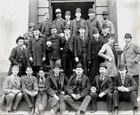Though administrators and superintendents get most of the recognition for asylum care, attendants were the really critical employees. Their skills and strengths, their attitudes and moods, affected patients profoundly. Clifford Beers, a Yale graduate who suffered a mental breakdown in the early 1900s and later wrote about it in A Mind That Found Itself, described his treatment at the hands of the attendants at his well-regarded institution.
Beers had been at odds with his attendants because they were so indifferent and deliberately cruel to him: refusing to give him a glass of water when he requested one, neglecting to bathe him, and the like. Beers retaliated with small acts of defiance, mainly verbal, which goaded his attendants into telling him they were just waiting for a chance to beat him.
Beers recorded that on November 25, 1902, he politely asked an attendant for a drink, was refused with curses, and then answered in kind. This was the opportunity his attendants had been waiting for; one held a lantern in Beers’ dark room while the other knocked him down, kicked him, and choked him. They stopped when he pretended to be unconscious, and left him “to live or die for all they cared,” Beers wrote. Beers showed the attending physician his bruises the next day, but neither attendant was fired for his actions.






